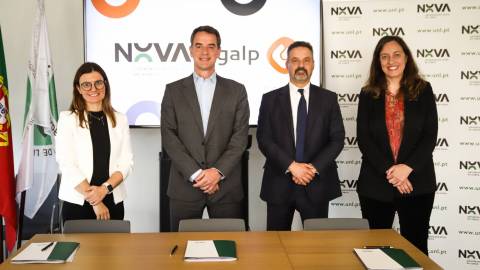
NOVA University Lisbon and Galp will promote, over the next three years, the development of new solutions in the field of clean and renewable energies by students, faculty and researchers gathered in the first interdisciplinary community of the University, called "Zero Carbon Energy".
Through a protocol signed this Thursday by the two institutions, NOVA palces all its know-how and its community at the service of the industry to find alternatives that can help to mitigate the effects of climate change, through a process of decarbonization, meeting the European Union's goals of achieving carbon neutrality by 2050.
In this domain, research projects will be developed in areas such as Renewable Energies, Mobility and Batteries. In the area of innovation and entrepreneurship, the multidisciplinary community of NOVA students and researchers will be called to participate in idea competitions, hackathons and in the development of proofs of concept, in response to challenges launched by Galp aligned with the sustainable development goals.
The protocol signing ceremony was attended, on the side of NOVA, by the Rector, João Sàágua, and the Vice-Rector, Isabel Rocha, and, on the side of Galp, by Georgios Papadimitriou, Member of the Board of Directors and of the Executive Committee, COO Renewables & New Businesses, and by Ana Casaca, Global Head of Innovation.
Isabel Rocha, Vice-Rector for Research, Innovation and Value Creation, said that "Sustainability is one of the central pillars of NOVA and being able to contribute with our research excellence to find greener alternatives in the energy field is the certainty that we are creating value for our community. It is time for us to act with solutions based on the best science and technology. This is also the role of academia and NOVA in particular".
In turn, Ana Casaca, Global Head of Innovation at Galp, added that "Half of the technologies that will help us decarbonise the world and make the energy transition are not yet known or tested. Collaboration with universities and the expansion of our innovation ecosystem is essential for Galp to overcome these technological challenges, thus being closer to the goal of carbon neutrality in 2050 and the democratisation of sustainable and inclusive energy solutions demanded by society."
In addition to areas related to research and innovation, this protocol will enable the development of joint initiatives in the area of education, as well as the promotion of talent and employment in the energy sector.